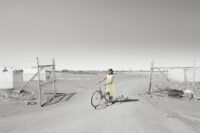guide
Political Stories, Alternative Views
by Alona Pardo
Photography has long been uncomfortable with its purported role as a simple recording device and as many of the photographers exhibiting in PHOTO 2021 demonstrate, the understanding of photographic truth, like all other truths, depends on an understanding of culture, belief and history. To this end the work of photographers including Mathieu Asselin, Dana Lixenberg and Laura El Tantawy—to name but a few from the exhibition Not Standing Still: New Approaches in Documentary Photography—raise questions of the documentary role of the photograph today and offer alternative ways of seeing, recording and understanding the events and situations that shape the world we live in.
Using film and photography to powerful effect, Asselin’s project Monsanto: A Photographic Investigation is a sprawling five-year project tracing and exposing the long destructive history of the eponymous chemicals manufacturing and agro-industrial company. Mixing the acutely personal with the documentary mode, Laura El Tantawy’s impressionistic chronicle of the revolution that rocked Egypt in the spring of 2011 blends grainy, nocturnal and fiery red photographs of the protest on the ground with archival images from her family album.
Both Dana Lixenberg and George Georgiou turn their razor-sharp gaze onto the streets of the United States. Taken between 1993 and 2015, Lixenberg’s magnus opus Imperial Courts tenderly documents the residents of the Watts Housing Estate, an area mired in the injustices of racial politics and a cycle of poverty, crime and gang violence. Using a large-format camera, preferring the slower, deliberate photographic process this involves, Lixenberg’s individual portraits, mostly African American residents, are in stark contrast to the often one-dimensional and sensationalised depictions portrayed in the media. Meanwhile, George Georgiou’s series Americans Parade—presented as a large-scale installation on Metro Tunnel construction hoardings—pictures onlookers at events taken across the United States throughout the 2016 presidential campaign that shed an unexpected light on the fractured nature of contemporary American life.
Addressing political headlines within Australia, Hoda Afshar investigates what provokes workers to become whistleblowers and speak out against the military, detention centres and more; Kate Disher-Quill & Phoebe Powell document health workers who have been operating on the frontline against COVID-19; Brook Andrew and Kate Golding both raise timely questions regarding the appropriateness of monuments; and Eliza Hutchison beautifully investigates how politics and the democratic process itself is mediated in her role as PHOTO 2021’s Photographer in Residence at the Parliament of Victoria, blending the political and the personal in a manner that will resonate with how we consume news today.
—Alona Pardo, Curator, Barbican Art Gallery, London
![Image: Alec Soth, [Adelyn, Ash Wednesday, New Orleans, Louisiana] (detail), from the series Sleeping by the
Mississippi, 2000. Courtesy the artist.](https://photo.org.au/api/wp-content/uploads/2020/02/Alec-Soth-Adelyn-Ash-Wednesday-New-Orleans-Louisiana2000-from-the-series-Sleeping-by-the-Mississippi.-200x160.jpg)
![Image: George Georgiou, [Algiers, New Orleans] from the series [Americans Parade], 2016.](https://photo.org.au/api/wp-content/uploads/2020/02/Algiers-New-Orleans-154-200x133.jpg)
![Image: Hoda Afshar, [Agonistes (still)] 2020, 1-channel digital video, colour, sound. Courtesy and © the artist and
Milani Gallery, Brisbane.](https://photo.org.au/api/wp-content/uploads/2020/02/Agonisties-Stills-020-200x112.jpg)
![Image: Kate Disher-Quill & Phoebe Powell, [0-95].](https://photo.org.au/api/wp-content/uploads/2020/10/2_0-95_KateDisherQuillPhoebePowell-200x143.jpg)
![Image: Brook Andrew, [SMASH IT], 2018, single channel video, 28 minutes. Edited by Giacomo Sanzani and Brook Andrew. This project was produced through a Smithsonian Artist Research Fellowship.](https://photo.org.au/api/wp-content/uploads/2020/10/SMASH-IT-Still002-200x113.jpg)
![Image: Kate Golding, from the series [Near this spot], 2012 – 2020.](https://photo.org.au/api/wp-content/uploads/2020/02/kategolding_program5-200x141.jpg)
![Eliza Hutchison, Just wanted you to know Eliza Hutchison, from the series [Just wanted you to know], 2020-21. Courtesy the artist.](https://photo.org.au/api/wp-content/uploads/2021/02/Eliza-new-image-200x125.jpg)
![Image: Gustavo Germano, detail from the series [Auscenias (Absences)].](https://photo.org.au/api/wp-content/uploads/2020/03/Ausencias_GustavoGermano_05-200x149.jpg)
![Image: Ruth Maddison, [My parents gave me a colourful life (1976)], 2020.](https://photo.org.au/api/wp-content/uploads/2020/10/Ruth-Maddison-My-parents-gave-me-a-colourful-life-1976-inkjet-pint-on-rag-paper-2020-200x134.jpg)
![Image: Pat Brassington, [Flushed], 2019. Courtesy the artist and ARC ONE Gallery.](https://photo.org.au/api/wp-content/uploads/2020/02/Brassington_Flushed_2019_75-x-75-cm_Courtesy-of-the-artist-and-ARC-ONE-200x200.jpg)
![7_-an-invitation-to-dance-Ann-Shelton©-border-crop Image: Ann Shelton, [an invitation to dance] (detail), 2020.](https://photo.org.au/api/wp-content/uploads/2020/11/7_-an-invitation-to-dance-Ann-Shelton©-border-crop-1-155x200.jpg)
![Image: Michael Cook [Livin’ the dream (Welcome Home)], 2020. Courtesy the artist and THIS IS NO FANTASY.](https://photo.org.au/api/wp-content/uploads/2020/10/2-MCLivintheDreamWelcomeHome-200x133.jpg)

![Image: James Tylor, [Economics of Minerals] (detail), 2020.](https://photo.org.au/api/wp-content/uploads/2020/02/Economics-of-Minerals-2-2020-Silver-Vinyl-on-photographic-paper-100x100cm-200x200.jpg)
![Image: Grace Wood, [Abundance; scattered] (study for Rose Pavilion), 2020. Found images, digital collage. Images sourced from the State Botanical Collection, Royal Botanic Gardens Victoria and the artist’s personal archive.](https://photo.org.au/api/wp-content/uploads/2020/02/Grace-Wood-Abundance-scattered-study-for-Rose-Pavilion-2020-150x200.jpg)
![Image: Filippo Menichetti and Martin Errichiello, from [In Fourth Person]. Courtesy the artists.](https://photo.org.au/api/wp-content/uploads/2020/02/InFourthPerson-1-200x162.jpg)
![Undercurrent_Peta Clancy Peta Clancy, [Undercurrent], 2018-19, inkjet pigment print. Courtesy the artist and Dominik Mersch Gallery.](https://photo.org.au/api/wp-content/uploads/2020/12/Undercurrent_Peta-Clancy-200x142.jpg)
![Image: Broomberg & Chanarin, [The Revolutionary], from the series [Spirit is a bone], 2013. Courtesy the artists.](https://photo.org.au/api/wp-content/uploads/2020/02/The-Revolutionary-200x136.jpg)
![Image: Maija Tammi, [One of Them is Human 1] (detail), 2017.](https://photo.org.au/api/wp-content/uploads/2020/02/one_of_them_is_a_human_1_large_file-185x200.jpg)
![Image: Zanele Muholi, [Nomthetho Vingi, Arcadia, Port Elizabeth] (detail), 2017. Courtesy Stevenson, Cape Town/
Johannesburg and Yancey Richardson, New York © Zanele Muholi.](https://photo.org.au/api/wp-content/uploads/2020/02/Nomthetho-Vingi-Arcadia-Port-Elizabeth-2017-IMG_6802-VVG-FINAL-crop-132x200.jpg)
![Image: Zanele Muholi, [Hlonipha, Cassilhaus, Chapel Hill, North Carolina], 2016. Courtesy Stevenson, Cape Town/
Johannesburg and Yancey Richardson, New York. ©Zanele Muholi.](https://photo.org.au/api/wp-content/uploads/2020/02/Hlonipha-Cassilhaus-Chapel-Hill-North-Carolina-2016_0491OP-133x200.jpg)
![Image: Atong Atem, [Saba and Gabby], 2020. Courtesy the artist and MARS Gallery.](https://photo.org.au/api/wp-content/uploads/2020/02/Atong-web-thumbnail-crop-200x123.jpg)
![Image: Leyla Stevens, [A Line in the Sea], 2019. Courtesy the artist.](https://photo.org.au/api/wp-content/uploads/2020/02/A-Line-in-the-Sea-2019-3-channel-video_02-200x113.jpg)
![Image: Shea Kirk, [Sam Biddle] (left and right view), 2019.](https://photo.org.au/api/wp-content/uploads/2020/02/SheaKirk_VANTAGES_DAINESINGER2021_promo_04_Sam_Biddle-200x125.jpg)
![Image: Laura Delaney, [The Rise and Fall] (detail), 2020. Image: Laura Delaney, [The Rise and Fall] (detail), 2020.](https://photo.org.au/api/wp-content/uploads/2020/02/Laura-Delaney-The-Rise-and-Fall-Detail-1-200x141.jpg)
![Image: Simon Fujiwara, [Joanne], 2016/2018. Courtesy the artist; FVU, The Photographers’ Gallery; Ishikawa Foundation; and Esther Schipper, Berlin. Film still © the artist.](https://photo.org.au/api/wp-content/uploads/2020/02/vlcsnap-2016-11-14-11h31m43s150-200x112.jpeg)
![Kenta Cobayashi Photographic Universe 2020 Image: Kenta Cobayashi, [Photographic Universe]
(detail), 2020.](https://photo.org.au/api/wp-content/uploads/2020/11/Kenta-Cobayashi-Photographic-Universe-2020-200x141.jpg)
![Image: Agnieszka Polska, [The New Sun (Tear)] (detail), 2017. Courtesy Żak Branicka, Berlin and Overduin & Co.,
Los Angeles © the artist.](https://photo.org.au/api/wp-content/uploads/2020/02/New-Sun-Tear_print_70x70-200x200.jpg)
![Image: Justine Varga, [Vicissitude], 2018-19.](https://photo.org.au/api/wp-content/uploads/2020/02/Justine-Varga_Vicissitude_2018-19-158x200.jpg)
![Image: Izabela Pluta, [Iterative composition 1979 (pages 17-18 Australia)], 2020. Courtesy the artist and Gallery Sally Dan-Cuthbert, Sydney.](https://photo.org.au/api/wp-content/uploads/2020/10/10.-Izabela-PLUTA_Iterative_composition_australia2020-200x125.jpg)
![Window Shopping Aaron Christopher Rees, [Window Shopping], 2020. Courtesy the artist.](https://photo.org.au/api/wp-content/uploads/2021/01/aaron-rees-200x133.jpg)